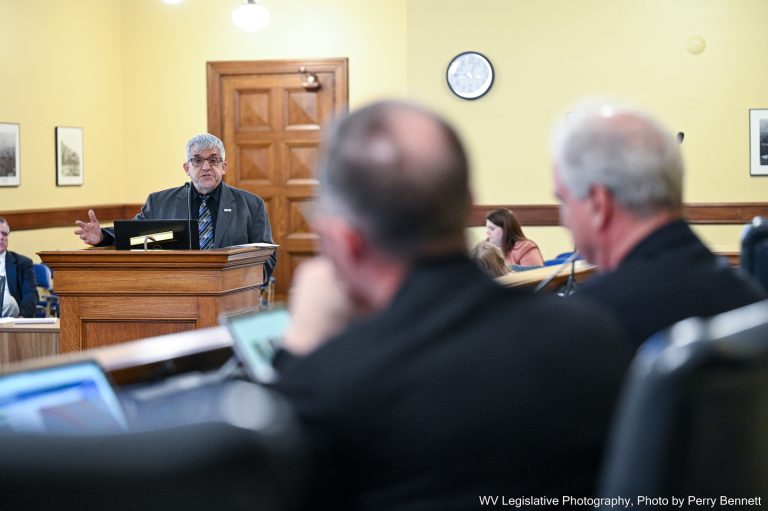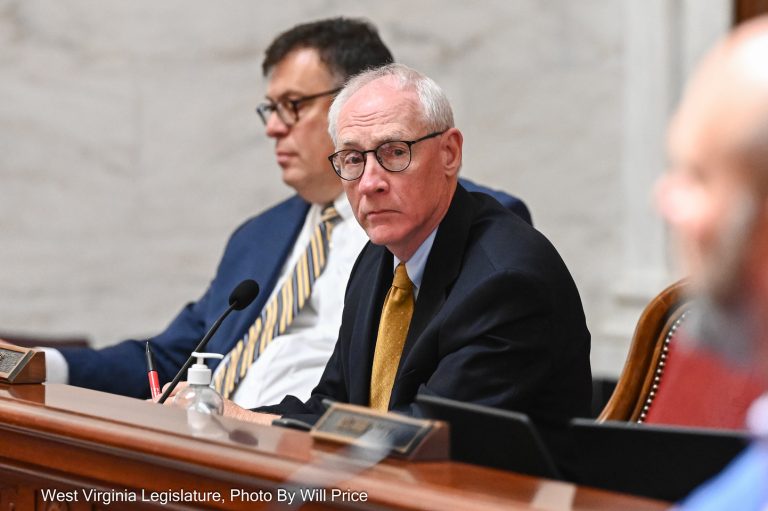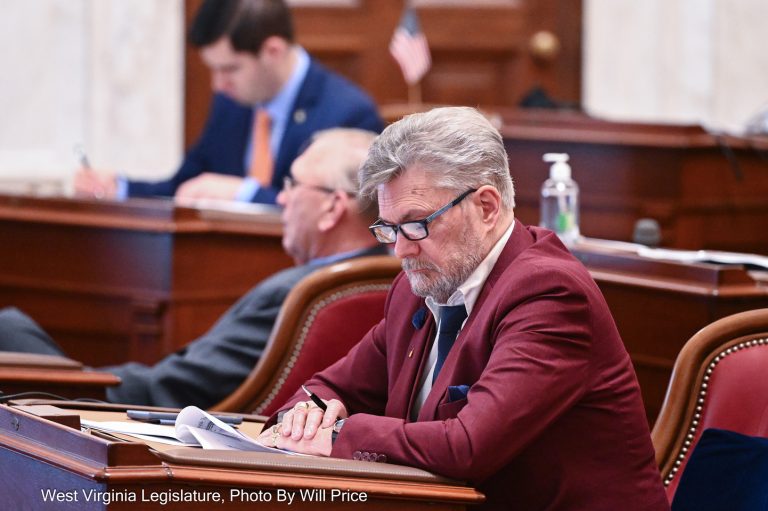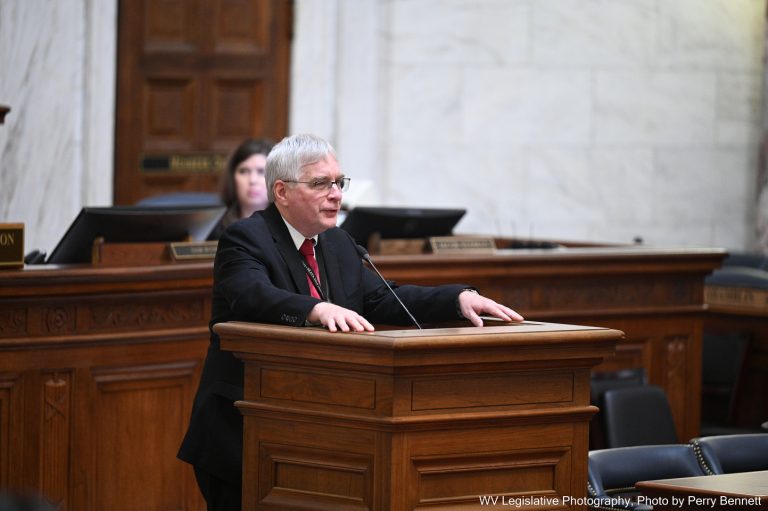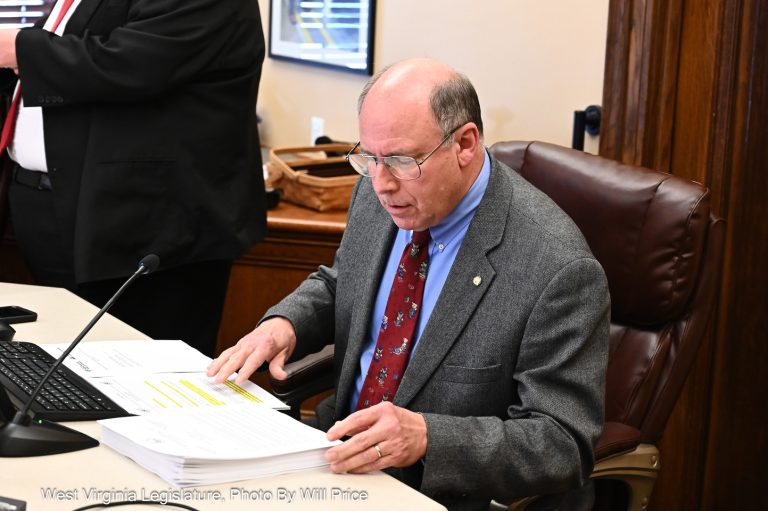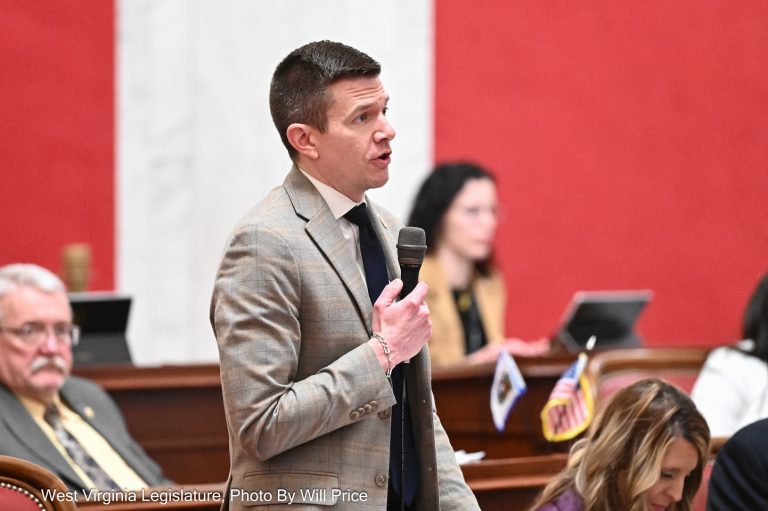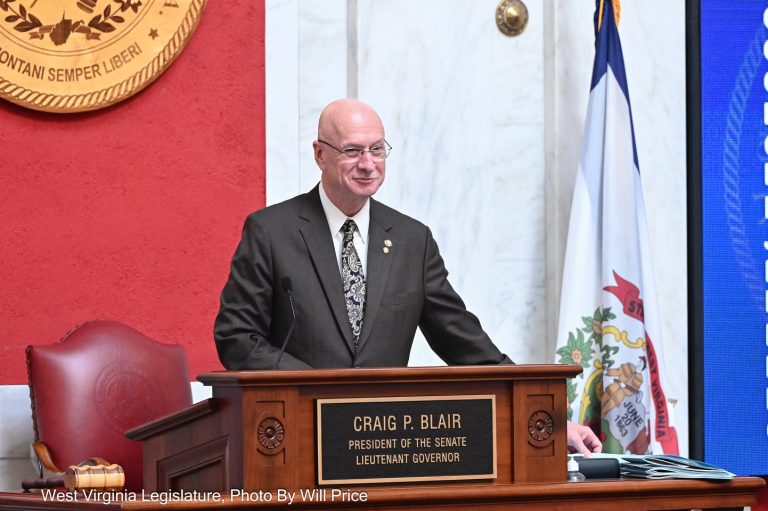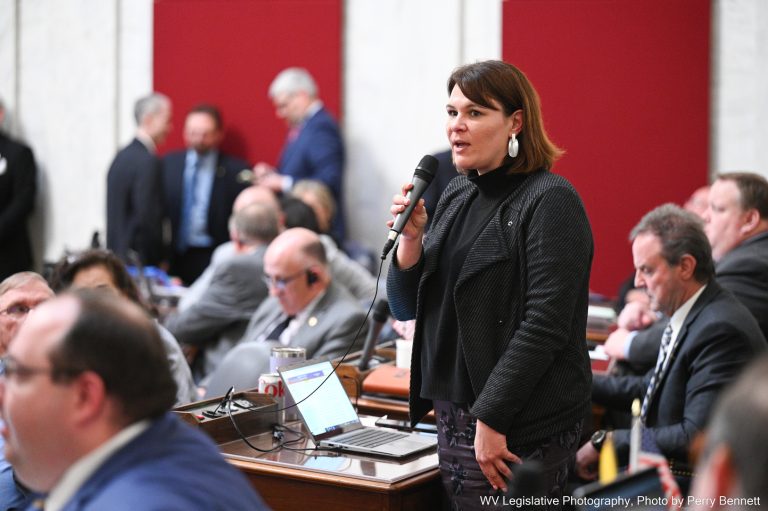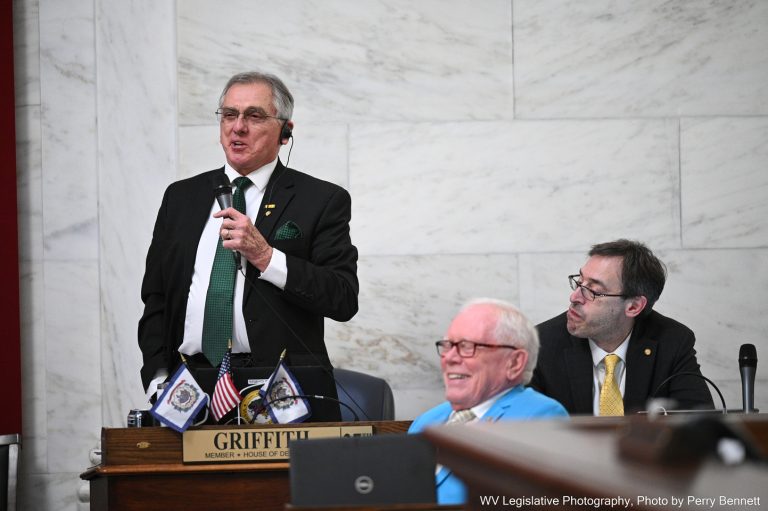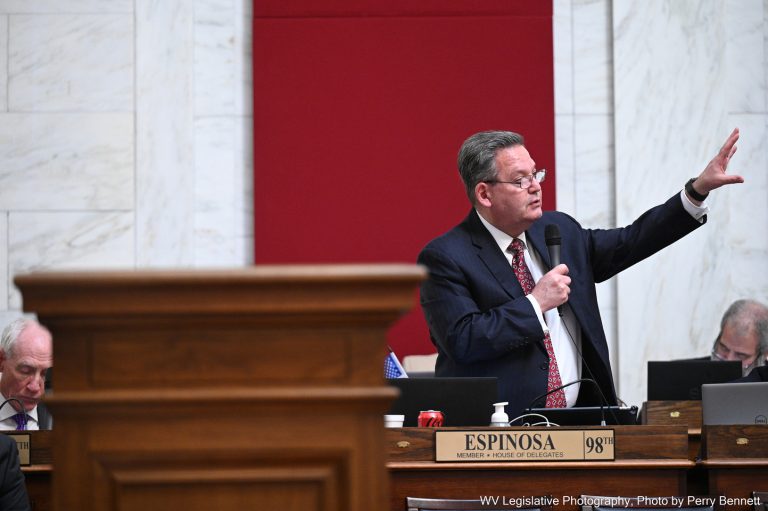(2575 Introduced Bills; 877 were introduced in the Senate; 279 Completed; 156 Senate Bills)
Senate Bill 540 updates the West Virginia coordinate systems.
Senate Bill 542 amends the procedure for filling a vacancy in offices of county commissioners having more than three commissioners.
Senate Bill 543 relates to research and economic development agreements for state institutions of higher education. It includes economic development as part of the mission for higher education research corporations.
Senate Bill 544 raises the threshold from $25,000 to $50,000 for the requirement of bids for municipal public works projects.
Senate Bill 547 authorizes legislative rules for the Higher Education Policy Commission.
Senate Bill 548 amends the appellate jurisdiction of the Intermediate Court of Appeals.
Senate Bill 551 modifies requirements related to the levying of service fees.
Senate Bill 557 establishes that firefighters are entitled to compensation for an entire holiday shift, even if only a portion of the shift falls on the holiday.
The bill doesn’t change the rate of time-and-a-half compensation, or the compensatory time allowed if the municipality chooses that methodology. The legislation makes holiday pay for municipal firefighters’ uniforms across the state.
Senate Bill 574 is a supplemental appropriation to the Division of Highways.
Senate Bill 578 clarifies that the offense of burglary involves a dwelling or outbuilding belonging to another.
Senate Bill 583 provides a streamlined process for evaluating an employer’s liability for personal injury and wrongful death claims involving operators of commercial motor vehicles. The bill also limits noneconomic damages in such actions to $1 million per plaintiff with certain exceptions.
Senate Bill 587 allows the State Fire Commission to propose legislative rules and promulgate interpretive and procedural rules for legislative approval.
Senate Bill 600 deals with the criteria for receiving reenlistment or retention bonuses for National Guard members. Under the bill, the Adjutant General can establish a program to provide enlistment bonuses to eligible prospects who become members of the West Virginia National Guard.
Senate Bill 602 will ensure schools and athletic events have a practiced plan of action in place to deal with cardiac emergencies when they arise. The bill highlights key pieces required for an effective cardiac emergency response plan. It will establish a response team, and circulate the plan throughout the school and it requires practice drills in preparation for a real emergency.
Senate Bill 603 amends the definition of “commercial solid waste facility” to exclude any solid waste facility that accepts solid waste collected by the owner or operator (or its affiliate(s)) of the solid waste facility for consolidation and subsequent transport to a disposal or recycling facility.
Senate Bill 605 requires electronic funds transfer of retirement contributions by employers participating in the Consolidated Public Retirement Board.
Senate Bill 606 clarifies payment upon death of members with less than 10 years of service.
Senate Bill 607 clarifies Municipal Police Officers and Firefighters Retirement System surviving spouse benefits.
Senate Bill 610 clarifies the authority of the Water Development Authority to appoint employees, officers, managers, attorneys, independent contractors, and consultants as necessary. The bill fixes their compensation and prescribes their duties in certain circumstances outside the classified civil service system.
Senate Bill 613 establishes the West Virginia Residential Mortgage Lender, Broker, and Servicer Act. This bill updates the law related to mortgage lender and broker regulation to align control of a licensee and key individuals with other regulatory programs. The legislation allows West Virginia to participate in and accept multistate examinations as well as application information and decisions to reduce the regulatory burden on licensees. Finally, the bill brings West Virginia into conformity with a majority of jurisdictions by permitting remote work for mortgage loan originators.
Senate Bill 623 requires the Division of Motor Vehicles to provide images of persons issued any identification or license to the Secretary of State for voter identification purposes.
Senate Bill 624 authorizes the cancellation of voter registration records for individuals no longer West Virginia citizens who have obtained a driver’s license in another state.
Senate Bill 628 declares certain claims against the state to be moral obligations of the state and authorizes payments.
Senate Bill 631 prohibits municipalities from shutting off a user’s water for nonpayment of a stormwater fee. The bill allows for municipalities to impose a lien to obtain payment but prohibits municipalities from shutting off services for nonpayment.
Senate Bill 632 continues the study group on competency and criminal responsibility, adds brain injuries to the subjects to be studied, amends the membership of the study group, establishes a steering committee within the study group, sets a deadline for the report to be presented and dictates which offices and committees the report should be submitted, and permits the steering committee to seek funding.
Senate Bill 643 is a supplemental appropriation bill to increase an item of appropriation in the Department of Education, School Building Authority account for the designated spending unit for expenditure during the fiscal year 2024.
Senate Bill 644 is a supplemental appropriation bill to add new items of appropriation in the Department of Commerce, Division of Forestry, and Geological and Economic Survey for the designated spending units for expenditure during the fiscal year 2024.
Senate Bill 649 clarifies that senior-status intermediate court judges and family judges are subject to the same per diem compensation limits as senior circuit court judges. This addresses a possible gap in the code created after the creation of the intermediate court of appeals and the inclusion of the family court judges in the judicial retirement system.
Senate Bill 650 is a supplemental appropriation bill to increase an existing item of appropriation to the Higher Education Policy Commission, Fairmont State University for the designated spending unit for expenditure during the fiscal year 2024.
Senate Bill 652 is a supplemental appropriation bill to add new items to the DHHR, Health Facilities for the designated spending unit for expenditure during the fiscal year 2024.
Senate Bill 653 is a supplemental appropriation bill to add new items to the School Building Authority, School Construction Fund for the designated spending unit for expenditure during the fiscal year 2024.
Senate Bill 656 is a supplemental appropriation bill to add new items to the DHHR, Division of Human Services for the designated spending unit for expenditure during the fiscal year 2024.
Senate Bill 657 Expires funds from Excess Lottery Revenue Fund to General Revenue.
Senate Bill 658 is a supplemental appropriation bill to add new items to the Department of Administration, Public Defender Services for the designated spending unit for expenditure during the fiscal year 2024.
Senate Bill 661 expires funds from Lottery Net Profits to General Revenue Surplus.
Senate Bill 663 is a supplemental appropriation bill to add new items to the Division of Administrative Services, Criminal Justice Fund for the designated spending unit for expenditure during the fiscal year 2024.
Senate Bill 665 is a supplemental appropriation bill to add new items to the DHHR, Division of Health for the designated spending unit for expenditure during the fiscal year 2024.
Senate Bill 667 relates to the creation of the Physicians Licensure Compact. The bill provides for a purpose. The bill creates definitions. The bill provides for state participation in the compact. The bill creates the compact privilege. The bill provides for the designation of the state from which the licensee is applying for a compact privilege. The bill defines adverse actions. The bill provides for the establishment of the PA Licensure Compact Commission. The bill defines the data system. The bill provides for rulemaking. The bill provides for oversight, dispute resolution, and enforcement. The bill provides for the date of implementation of the PA Licensure Compact Commission. The bill provides for construction and severability. Finally, the bill creates the binding effect of the compact.
Senate Bill 668 increases the amount of ephedrine, pseudoephedrine, or phenylpropanolamine a person may purchase annually.
Senate Bill 679 regulates certain plant-based derivatives, hemp-derived cannabinoid products, and Kratom.
Senate Bill 681 revises the mandatory service obligation for the National Guard doctor of medicine or doctor of osteopathic medicine degree program.
Senate Bill 687 makes changes to the Legislative Auditor’s scope of authority. The legislation puts the Legislative Auditor under the authority of the Joint Committee on Government and Finance, and specifically under the authority of the Speaker of the House and the President of the Senate. It clarifies that the Legislative Auditor does not have independent hiring authority, giving those powers to the joint committee. It eliminates fixed schedules for audits and makes audits up to the discretion of the Senate President and House Speaker. The bill also removes requirements in the code for audits to be conducted based on generally accepted government accounting standards used by the Financial Accounting Standards Board (FASB) and the Governmental Accounting Standards Board (GASB).
Senate Bill 690 creates a commission on West Virginia Agritourism to review and investigate means of preserving our farmland and growing our agricultural tourism and agricultural economic development. The commission will also recommend to the Legislature that appropriate legislation be enacted, establishing regulatory and legislative relief to foster the development and growth of Agritourism and successful farms.
Senate Bill 695 supplements and amends appropriations to Energy Assistance, TANF, and Child Care and Development
Senate Bill 696 supplements and amends appropriations to the Department of Homeland Security, Division of Emergency Management
Senate Bill 697 supplements and amends appropriations to DHHR, Consolidated Medical Service Fund
Senate Bill 698 supplements and amends appropriations to DHHR, Division of Human Services
Senate Bill 699 supplements and amends appropriations to DHHR, Child Support Enforcement Fund
Senate Bill 700 supplements and amends appropriations to Miscellaneous Boards and Commissions, Hospital Finance Authority
Senate Bill 701 supplements and amends appropriations to the Department of Education, School Construction Fund
Senate Bill 702 supplements and amends appropriations to DHHR, Laboratory Services Fund
Senate Bill 703 supplements and amends appropriations to the Department of Homeland Security, WV State Police
Senate Bill 704 supplements and amends appropriations to PSC, Motor Carrier Division
Senate Bill 705 supplements and amends appropriations to PSC
Senate Bill 707 supplements and amends appropriations to the Department of Commerce, Division of Natural Resources
Senate Bill 708 Supplements and amends appropriations to the Department of Agriculture, WV Spay Neuter Assistance Fund.
Senate Bill 709 Supplements and amends appropriations to the Department of Arts, Culture, and History, National Coal Heritage Area Authority.
Senate Bill 710 Supplements and amends appropriations to the State Board of Education, Aid for Exceptional Children
Senate Bill 712 revises the statute to reduce the minimum age for a cadet for the West Virginia State Police from the age of 21 to the age of 18.
Senate Bill 730 clarifies the sheriff’s commission compensation for the job duty of tax collector for the county at $15,000.
Senate Bill 732 requires cooperation between law-enforcement agencies and military authorities. The legislation provides that prosecuting attorneys may assign an assistant prosecutor to assist the National Guard or other military authority within the state. It also dictates that law enforcement is required to share certain information with military authorities regarding military members.
Senate Bill 751 creates and legalizes online charitable raffles.
Senate Bill 752 authorizes the Department of Agriculture to complete certain land transfers.
Senate Bill 755 provides safeguards when retail sellers engage in online delivery sales of tobacco products, tobacco-derived products, or vapor products via online certification. The bill permits retail sellers to engage third-party remote delivery services to carry out delivery sales to consumers.
Senate Bill 768 provides an exception to the confidentiality of child welfare records to allow the sharing of confidential information with law enforcement agencies and the National Center for Missing and Exploited Children.
Senate Bill 778 amends and adds certain qualifying offenses to enhance the sentence of a repeat offender.
Senate Bill 782 defines local permitting deadlines and extensions for applications for a permit, license, variance, or any other type of prior approval from a governing body or planning commission of a municipality or county for an action related to the development or improvement of the property.
Senate Bill 786 modifies the date for implementing massage establishment licensure and provides authority for the board to issue an emergency order halting establishment operation until the establishment complies.
Senate Bill 790 changes the reference to the Curator of the Department of Arts, Culture, and History to Cabinet Secretary.
Senate Bill 802 includes in the definition of “motor vehicle” a self-propelled vehicle designed primarily for, and used in, the occupation or business of farming, with a horsepower unit of 20 or greater; and the right to bring an action for breach of warranty involving a self-propelled vehicle designed primarily for and used in farming.
Senate Bill 803 provides that real property occupied by an immediate family member or former spouse of the owner exclusively for residential purposes be included in class two for assessment and taxation purposes. The bill also defines “immediate family member”.
Senate Bill 806 removes several required submissions to the Legislative Oversight Commission on Education Accountability (LOCEA) and removes a requirement for LOCEA to review the progress and implementation of the comprehensive systems of support for teacher and leader induction and professional growth.
Senate Bill 820 requires the Department of Human Services to create a program to improve the quality of care rendered to the substance use disorder population by applying automatic enrollment.
Senate Bill 824 expands the membership of the West Virginia Motorsport Committee from five to 18 members, including the chairperson.
Senate Bill 826 harmonizes the treatment of reciprocal deposit arrangements to satisfy security for public deposits from county commissions, municipal corporations, and boards of education. Current code sections relating to public deposits from municipal corporations and school boards provide two separate authorizations for depository institutions to employ reciprocal deposit arrangements to satisfy each security requirement. This bill will allow depository institutions to serve county commissions uniformly to municipal corporations and school boards.
Senate Bill 827 relates generally to salvage yards and defines regional distribution and dismantling centers. The bill also provides for a specialized regional distribution and dismantling license.
Senate Bill 834 adds a member to the Motor Vehicle Advisory Board and specifies that one of the members must be a representative of automobile auctions of primarily salvage vehicles.
Senate Bill 837 authorizes Public Defender Corporations until July 1, 2025, to reorganize offices to conform to the circuit reconfiguration enacted during the 2023 Regular Session of the Legislature.
Senate Bill 841 sets the amount of employment taxes and benefits, modifies the calculation of the taxable wage base, and modifies the methodology for calculating the maximum benefit rate.
Senate Bill 844 changes the name of the “Educational Broadcasting Authority” to the “Educational Broadcasting Commission.”
Senate Bill 850 Updates the Consumer Credit and Protection Act by defining terms, removing commercial tort claims exclusion from the definition of litigation financing, and excluding certain non-profit organizations from the definition of litigation financing.
Senate Bill 858 clarifies that taxpayers must begin requesting reconsideration of property valuation, classification, or taxability with their county assessor’s office. This request may be in writing, in person, or over the phone. Further, the taxpayer must file a written petition in certain instances before seeking an appeal at the Office of Tax Appeals.
Senate Bill 864 Clarifies the reporting requirements of the Grant Transparency and Accountability Act. The bill clarifies what grants are subject to reporting requirements, defines terms, and makes technical clarifications.
Senate Bill 865 changes the “Curator” of the Department of Arts, Culture, and History to the “Cabinet Secretary” of the Department of Arts, Culture, and History. The bill also adds the Educational Broadcasting Authority as a section under the department, as a separate, but not independent, agency. The legislation adds the Educational Broadcasting Commission to the list of citizens commissions.
Senate Bill 866 designates the State Treasurer as the chairperson of the West Virginia Investment Management Board effective July 1, 2025. The bill requires said chairperson to appoint a chief executive officer subject to board approval.
Senate Bill 868 is a supplemental appropriation to the Department of Commerce, Geological and Economic Survey.
Senate Bill 871 is a supplemental appropriation to the Department of Veterans’ Assistance, Veterans’ Facilities.
Senate Bill 872 relates to county fire service fees.
Senate Bill 873 sets the schedule for tax installment payments.
Senate Bill 874 relates to the West Virginia Division of Multimodal Transportation.
Senate Bill 875 relates to certain insurance coverage provided by BRIM.
Senate Bill 876 supplements and amends appropriations to the Department of Health and Human Resources, Health Facilities.
Senate Bill 877 supplements and amends appropriations to the Higher Education Policy Commission.


